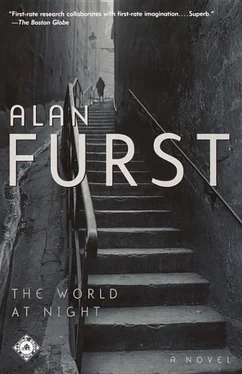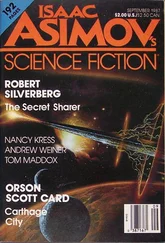Alan Furst - The World at Night
Здесь есть возможность читать онлайн «Alan Furst - The World at Night» весь текст электронной книги совершенно бесплатно (целиком полную версию без сокращений). В некоторых случаях можно слушать аудио, скачать через торрент в формате fb2 и присутствует краткое содержание. Жанр: Шпионский детектив, на английском языке. Описание произведения, (предисловие) а так же отзывы посетителей доступны на портале библиотеки ЛибКат.
- Название:The World at Night
- Автор:
- Жанр:
- Год:неизвестен
- ISBN:нет данных
- Рейтинг книги:5 / 5. Голосов: 1
-
Избранное:Добавить в избранное
- Отзывы:
-
Ваша оценка:
- 100
- 1
- 2
- 3
- 4
- 5
The World at Night: краткое содержание, описание и аннотация
Предлагаем к чтению аннотацию, описание, краткое содержание или предисловие (зависит от того, что написал сам автор книги «The World at Night»). Если вы не нашли необходимую информацию о книге — напишите в комментариях, мы постараемся отыскать её.
The World at Night — читать онлайн бесплатно полную книгу (весь текст) целиком
Ниже представлен текст книги, разбитый по страницам. Система сохранения места последней прочитанной страницы, позволяет с удобством читать онлайн бесплатно книгу «The World at Night», без необходимости каждый раз заново искать на чём Вы остановились. Поставьте закладку, и сможете в любой момент перейти на страницу, на которой закончили чтение.
Интервал:
Закладка:
Alan Furst
The World at Night
THE 16TH ARRONDISSEMENT
10 May, 1940.
Long before dawn, Wehrmacht commando units came out of the forest on the Belgian border, overran the frontier posts, and killed the customs officers. Glider troops set the forts ablaze, black smoke rolling over the canals and the spring fields. On some roads the bridges were down, but German combat engineers brought up pontoon spans, and by first light the tanks and armored cars were moving again. Heading southwest, to force the river Meuse, to conquer France.
In Paris, the film producer Jean Casson was asleep. His assistant, Gabriella Vico, tried to wake him up by touching his cheek. They’d shared a bottle of champagne, made love all night, then fallen dead asleep just before dawn. “Are you awake?” she whispered.
“No,” he said.
“The radio.” She put a hand on his arm in a way that meant there was something wrong.
What? The radio broken? Would she wake him up for that? It had been left on all night, now it buzzed, overheated. He could just barely hear the voice of the announcer. No, not an announcer. Perhaps an engineer-somebody who happened to be at the station when news came in was reading it as best he could:
“The attack … from the Ardennes forest …”
A long silence.
“Into the Netherlands. And Belgium. By columns that reached back a hundred miles into Germany.”
More silence. Casson could hear the teletype clattering away in the studio. He leaned close to the radio. The man reading the news tried to clear his throat discreetly. A paper rattled.
“Ah … the Foreign Ministry states the following …”
The teleprinter stopped. A moment of dead air. Then it started up again.
“It is the position of the government that this aggression is an intolerable violation of Belgian neutrality.”
Gabriella and Casson stared at each other. They were hardly more than strangers. This was an office romance, something that had simmered and simmered, and then, one night. But the coming of war turned out to be, somehow, intimate, like Christmas, and that was a surprise to both of them. Casson could see how pale she was. Would she cry? He really didn’t know very much about her. Young, and slim, and Italian-well, Milanese. Long hair, long legs. What was she- twenty-six? Twenty-seven? He’d always thought that she fitted into her life like a cat, never off balance. Now she’d been caught out-here it was war, and she was smelly and sticky, still half-drunk, with breath like a dragon.
“Okay?” He used le slang Americain.
She nodded that she was.
He put a hand on her cheek. “You’re like ice,” he said.
“I’m scared.”
He went looking for a cigarette, probing an empty packet of Gitanes on the night table. “I have some,” she said, glad for something to do. She rolled off the bed and went into the living room. Merde, Casson said to himself. War was the last thing he needed. Hitler had taken Austria, Czechoslovakia, then Poland. France had declared war, but it meant nothing. Germany and France couldn’t fight again, they’d just done that-ten million dead, not much else accomplished. It was simply not, everybody agreed, logique.
Gabriella returned, lit a cigarette and handed it to him. “May I take a bath?” she asked.
“Of course. There are towels-”
“I know.”
Casson found his watch on the night table. 5:22. Water splashed into the bathtub. The tenant on the floor below was a baroness-she didn’t like noise. Well, too bad. She already hated him anyhow.
He got out of bed, walked to the glass door that opened on the little balcony. He pushed the drape aside; you could see the Eiffel Tower across the river. The rue Chardin was quiet-the 16th Arrondissement was always quiet, and Passy, its heart and soul, quieter still. One or two lights on, people didn’t know yet. So beautiful, his street. Trees in clouds of white blossom, dawn shadow playing on the stone buildings, a lovely gloom. He’d shot a scene from No Way Out here. The hero knows the cops are onto him, but he leaves his hideout anyhow, to see his rich girlfriend one last time.
The telephone rang; two brief whirring jingles. Paused a few seconds. Rang again. Jesus, the baroness. Gingerly, Casson picked up the receiver.
“Yes?”
“Have you heard?”
It was his wife. They had been separated for years, living their own lives in their own apartments. But they remained married, and shared a set of old friends.
“Yes,” he said.
“I’m not disturbing you, am I?”
“No, Marie-Claire. I was up.”
“Well, what shall we do?”
Fight, he thought. Support the troops, hold rallies, you had to-
“About tonight, I mean.”
Now he understood. They were giving a dinner party at her apartment. “Well, I don’t see how, I mean, it’s war.”
“Bruno says we must go on. We must not give in to Hitler.”
Bruno was Marie-Claire’s boyfriend. He owned an agency that sold British motorcars, had his hair cut twice a week, and spent a fortune on silk dressing gowns.
“He’s not wrong,” Casson said.
“And the cake has been ordered.” The twentieth wedding anniversary of the Langlades-a cake from Ponthieu.
“All right. Let’s go ahead. Really, what else is there to do?”
“Are you going to the office?”
“Of course.”
“Can you telephone later on?”
“I will.”
He hung up. The door to the bathroom was half-open, the water had stopped. Casson paused at the threshold.
“You can come in,” Gabriella said.
Her skin was flushed from the heat of the bath, wet strands of hair curled at the back of her neck, her breasts and shoulders were shiny with soapsuds. “They are going to arrest me,” she said, as though it were hard for her to believe.
“Why would they do that?”
She shrugged. “I am Italian. An Italian citizen.”
Enemy alien. It was absurd, he wanted to laugh, but then he didn’t. Mussolini was Hitler’s ally, a treaty had been signed in 1939. The Pact of Steel, no less. But it was only ridiculous until police came to the door. Gabriella looked up at him, biting her lip. “Now look,” he said. “It’s too early for tears. This is Paris- there’s always somebody you can talk to, always special arrangements. Nothing’s final here.”
Gabriella nodded gratefully, she wanted to believe he was right.
Casson caught a glimpse of himself in the steamy mirror. Dark-like a suntan that never really went away-naked, lean, with a line of hair up the center and shoulders a little heavier than his suits suggested. Not so bad-for forty-two. Still, if he were going to be authoritative, he’d better get dressed.
He stood in front of his closet, gazed pensively at a row of suits. In the distance, a two-note siren, high/low. Police or ambulance, and coming nearer. Casson went to the balcony and looked out. An ambulance, rolling to a stop just up the block. Two women ran into the street, one clutching a robe against her chest, the other in the black dress of a concierge. Frantically, they urged the men from the ambulance into the building.
Casson went back to the closet. On the radio, the premier of France, Paul Reynaud, was reading a statement: “The French army has drawn its sword; France is gathering herself.”
A little after ten, Casson left for the office. In the streets of Passy, the war had not yet been acknowledged-life went on as always; tres snob, the women in gloves, the men’s chins held at a certain angle. Casson wore a dark suit, sober and strong, and a red-and-blue tie with a white shirt-the colors of France. But the blue was teal, the red faded, and the shirt a color the clerk had called “linen”. He stopped at a newspaper kiosk for Le Temps, but it was not to be. A huge crowd was clamoring for papers, he would have to wait.
Читать дальшеИнтервал:
Закладка:
Похожие книги на «The World at Night»
Представляем Вашему вниманию похожие книги на «The World at Night» списком для выбора. Мы отобрали схожую по названию и смыслу литературу в надежде предоставить читателям больше вариантов отыскать новые, интересные, ещё непрочитанные произведения.
Обсуждение, отзывы о книге «The World at Night» и просто собственные мнения читателей. Оставьте ваши комментарии, напишите, что Вы думаете о произведении, его смысле или главных героях. Укажите что конкретно понравилось, а что нет, и почему Вы так считаете.












